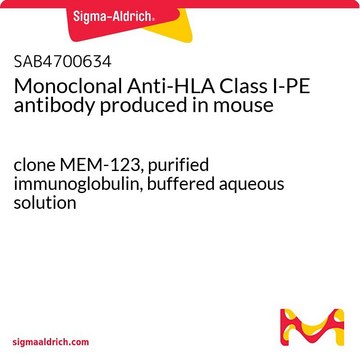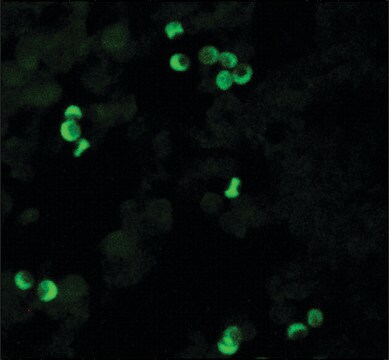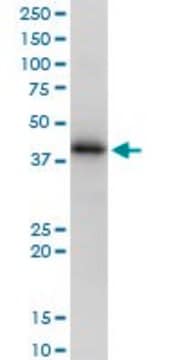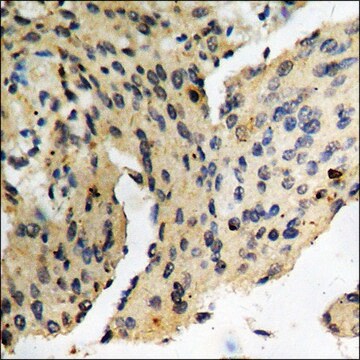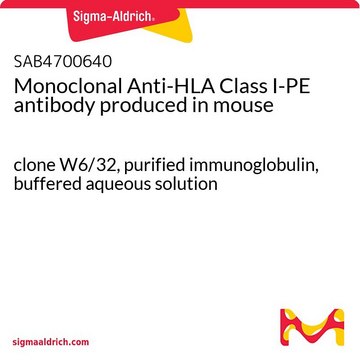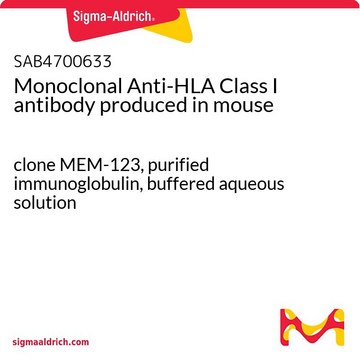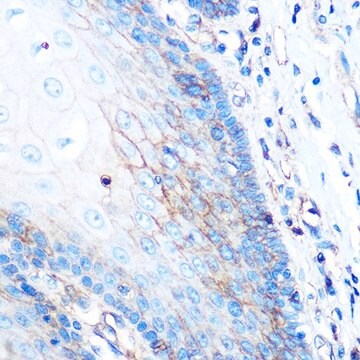SAB4700639
Monoclonal Anti-HLA Class I-FITC antibody produced in mouse
clone W6/32, purified immunoglobulin, buffered aqueous solution
Iniciar sesiónpara Ver la Fijación de precios por contrato y de la organización
About This Item
Código UNSPSC:
12352203
NACRES:
NA.41
Productos recomendados
origen biológico
mouse
Nivel de calidad
conjugado
FITC conjugate
forma del anticuerpo
purified immunoglobulin
tipo de anticuerpo
primary antibodies
clon
W6/32, monoclonal
Formulario
buffered aqueous solution
reactividad de especies
human
concentración
1 mg/mL
técnicas
flow cytometry: suitable
isotipo
IgG2a
Nº de acceso NCBI
Nº de acceso UniProt
Condiciones de envío
wet ice
temp. de almacenamiento
2-8°C
modificación del objetivo postraduccional
unmodified
Información sobre el gen
human ... HLA-A(3105) , HLA-B(3106) , HLA-C(3107)
Descripción general
The antibody W6/32 recognises MHC Class I molecules (MHC Class Ia) that are expressed on the surface of all human nucleated cell types. The antibody W6/32 is a valuable reagent for analysing variations in HLA class I expression in different disease states e.g. liver disease, muscular dystrophy, inflammatory myopathy and other neuromuscular disorders.
The previously assigned protein identifier P01891 has been merged into P04439. Full details can be found on the UniProt database.
The previously assigned protein identifier P01891 has been merged into P04439. Full details can be found on the UniProt database.
Inmunógeno
Membrane of human tonsil cells
Aplicación
The reagent is designed for Flow Cytometry analysis. Suggested working dilution is 1:300. Indicated dilution is recommended starting point for use of this product. Working concentrations should be determined by the investigator.
Características y beneficios
Evaluate our antibodies with complete peace of mind. If the antibody does not perform in your application, we will issue a full credit or replacement antibody. Learn more.
Forma física
Solution in phosphate buffered saline, pH 7.4, with 15 mM sodium azide.
Cláusula de descargo de responsabilidad
Unless otherwise stated in our catalog or other company documentation accompanying the product(s), our products are intended for research use only and are not to be used for any other purpose, which includes but is not limited to, unauthorized commercial uses, in vitro diagnostic uses, ex vivo or in vivo therapeutic uses or any type of consumption or application to humans or animals.
¿No encuentra el producto adecuado?
Pruebe nuestro Herramienta de selección de productos.
Código de clase de almacenamiento
10 - Combustible liquids
Punto de inflamabilidad (°F)
Not applicable
Punto de inflamabilidad (°C)
Not applicable
Elija entre una de las versiones más recientes:
¿Ya tiene este producto?
Encuentre la documentación para los productos que ha comprado recientemente en la Biblioteca de documentos.
Yukie Yamaguchi et al.
Arthritis research & therapy, 12(6), R205-R205 (2010-11-06)
Microvasculopathy is one of the characteristic features in patients with systemic sclerosis (SSc), but underlying mechanisms still remain uncertain. In this study, we evaluated the potential involvement of monocytic endothelial progenitor cells (EPCs) in pathogenic processes of SSc vasculopathy, by
Magali Le Discorde et al.
Human immunology, 64(11), 1039-1044 (2003-11-07)
Human leukocyte antigen (HLA)-G retains the capacity to modulate immune responses, favoring the establishment of tolerance in solid-tissue allotransplants. To better understand the mechanisms that promote corneal allograft survival, we investigated whether HLA-G was an immunoregulatory factor involved in corneal
Nuestro equipo de científicos tiene experiencia en todas las áreas de investigación: Ciencias de la vida, Ciencia de los materiales, Síntesis química, Cromatografía, Analítica y muchas otras.
Póngase en contacto con el Servicio técnico

